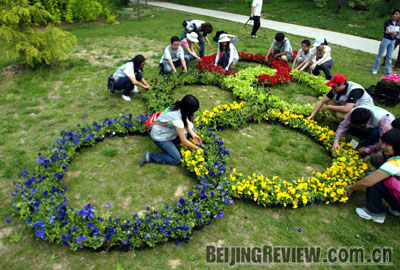|

GREEN COMMITMENT: College students from China and South Korea
make Olympic rings with flowers in the Beijing Botanical Garden, as part of a youth
exchange program on environmental protection
The success of the Olympics has imbued the Chinese with a strong sense of national pride, he said. With this sense, China will show greater openness and be more willing to follow international rules, a posture welcomed by the outside world. At the same time, the Chinese may become less willing to compromise with foreign countries, mounting pressure on China's diplomatic officials. Which one will become the dominant mentality in China has yet to been seen, he said.
Toward regional unity
In Seoul, President Hu met South Korean leaders including President Lee Myung Bak, pledging to make joint efforts to further their bilateral relations.
In a joint communiqué issued on August 25, the two countries agreed to promote their "strategic cooperative partnership" in a comprehensive way. China and South Korea established diplomatic relations in 1992. The two countries upgraded their relations to a strategic cooperative partnership during Lee's first state visit to China in May this year, paving the way for expanded bilateral collaboration.
China is currently South Korea's largest trading partner, export market and overseas investment destination. South Korea is China's third largest trading partner and fourth largest source of foreign direct investment. The two countries' trade volume has increased by 25 percent annually since 1992. It reached $159 billion in 2007 and $75.8 billion from January to May this year.
The great achievements in the political, economic, social and cultural relations between China and South Korea since 1992 have not only benefited the two countries, but also contributed to peace and development in Asia and the whole world, the communiqué said.
In the communiqué, China and South Korea agreed to enhance political trust, support each other's peaceful development, strengthen high-level contact, expand communication between the governments, parliaments and political parties of the two countries and increase dialogue on defense.
They also vowed to coordinate on regional and global issues-maintaining peace and stability on the Korean Peninsula and in Northeast Asia, participating in Asian regional integration and strengthening cooperation on international affairs.
South Korea will seek to develop ties with North Korea through reconciliation and cooperation, while China supports the two countries' reunification, according to the communiqué.
Today, Northeast Asia is in a "subtle historical period" beset with complicated problems, Shi said. While the United States plays a predominant role in the region with Japan as its follower, the Asian countries have yet to unite. So the upgraded ties between China and South Korea are essential to regional solidarity and stability, he said.
As South Korea shifts its diplomatic focus from the United States and Japan to China, it expects China to play a role in facilitating improved relations between South Korea and North Korea as well as progress in the six-party talks aimed at resolving the North Korean nuclear issue, he said.
During Hu's visit, China and South Korea signed a number of cooperative documents on trade, high technology, energy conservation, desertification control and the hosting of world expos. Shanghai and Yeosu, South Korea, will host the World Expo in 2010 and 2012, respectively. The two countries designated 2010 as Visit China Year and 2012 as Visit Korea Year to bolster people-to-people exchanges.
A record 6 million people traveled between China and South Korea in 2007. By the end of 2007, the number of South Koreans staying in China on a long-term basis had reached 700,000, while more than 530,000 Chinese lived, worked and studied in South Korea.
By the end of last year, the number of Chinese students in South Korea had exceeded 34,000, accounting for two thirds of all overseas students there. South Korean students in China had totaled 64,000 by that time, more than students from any other foreign country.
More than 830 flights shuttle between 40 cities in China and South Korea every week. | 